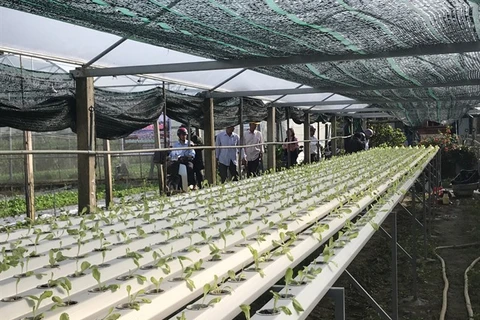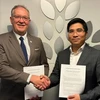 Nguyen Nhu Thanh, an IT engineer, researches and measures transceiver module for radar products at the military-run Viettel. (Photo tienphong.vn)
Nguyen Nhu Thanh, an IT engineer, researches and measures transceiver module for radar products at the military-run Viettel. (Photo tienphong.vn) The VRS-MCR radar is a multi-tasking X-band medium-range mobile unit that can perform airspace and flight targeting tasks and provide warnings. Thanh and his partners in the military-run Viettel completed the system and plan to produce 15 of them by 2025, generating revenue of nearly 2 trillion VND (85 million USD).
Thanh, who is 35 years old and was born in northern Thai Binh province, has achieved many outstanding accomplishments in researching and applying modern technology to radar systems. He received a certificate of merit from the Ministry of National Defence in 2021 and the Ho Chí Minh Prize in Science and Technology.
After graduating from Hanoi University of Science and Technology in 2012, Thành decided to join the military-run Viettel Military Industry and Telecoms Group, although he received many job offers at large companies to work in a challenging environment.
Thanh’s first assignment was to research Viettel's products, and he managed to expand the velocity range of the radar system in 2014. This solved the problem of interference from reflected signals.
This solution was then applied to all radar products manufactured by Viettel and recognised by the International Radar Symposium, a prestigious international conference on radars, in Germany in 2019.
He was later assigned to find solutions for the VRS-2DM radar system, which initially struggled to prevent meteorological interference in cloudy and rainy weather.
Thanh and his team were assigned to find solutions within two weeks.
“It was almost an impossible mission," he said. "Our team had hardly slept, trying all traditional methods in the first week and found that they didn’t work.”
In the next week, Thanh came up with the idea that offered up to 98% filtering of meteorological noise without affecting the target's visibility.
The initiative was applied to all VRS-2DM radar products in northern cities and provinces and has been deployed throughout the country, bringing thousands of billions of đồng in revenue and achieving national security and defence.
In 2018, Thành was assigned to build 3D radars and master the core technologies of this product within two years.
He completed the task just a year later and it was the first time Việt Nam produced a brand-new 3D radar with features equivalent to foreign products, opening a new era of radar research and production for the country.
Thanh is now head of the Level 2 Processing Department, Radar Centre of Viettel, and his team managed to complete the VRS-MCX radar project in a very short period despite the disruption of the supply chain of materials and components caused by the COVID-19 pandemic.
“Normally it takes at least 18-24 months to finish a product and one more year to optimise the product and complete testing," he said. "However, our product only took about 18 months.”
The team had to use technical solutions to make up for those shortfalls.
He led the team to work on the project in different periods of time. He focused on team development, recruiting, and training personnel for important stages such as manufacturing, integrating, and testing products.
He said previous products mainly served military purposes. In the future, under Viettel’s plans, the radar industry would develop products for both civilian and military purposes. Military products would be upgraded.
Thanh and his team will focus on researching and developing products for export shortly as Vietnam’s radar technology has a lot of potential.
Thanh believes that the key to success lies in combining scientific research with practical needs.
“No matter how sublime scientific research is, it makes no sense if it does not bring practical value to people," Thanh said. "That’s what we always keep in mind.”
“I believe that in the next few years, our radar products will definitely be exported to foreign countries.”
Most of Thanh’s team members are people under 30 years old and are always full of energy and creativity.
“I always tell them that it is important to prioritise personal growth by choosing the work that helps them transform themselves on a daily basis rather than selling themselves for higher-paid jobs,” he said./.
VNA























